 | TODAY IN SCIENCE HISTORY
NEWSLETTER - 7 MARCH |
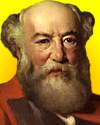 On 7 Mar 1839, Ludwig Mond was born, the German-British chemist whose varied contributions to the chemical industry include perfecting a method of soda manufacture, a process for the extraction of nickel, and coining (with Charles Langer) the term “fuel cell” while attempting to generate electricity by reacting hydrogen with oxygen. On 7 Mar 1839, Ludwig Mond was born, the German-British chemist whose varied contributions to the chemical industry include perfecting a method of soda manufacture, a process for the extraction of nickel, and coining (with Charles Langer) the term “fuel cell” while attempting to generate electricity by reacting hydrogen with oxygen.
Although one of the most successful industrial chemists of his time, his name may be unfamiliar to you. To better understand the significance of his work, read more in this short Biography of Ludwig Mond.
|
 On 7 Mar 1876, Alexander Graham Bell patented an "Improvement in Telegraphy" which established the principle of the telephone. He would then face a patent battle to establish priority over a competitor's patent application filed the same day. Today's Science Store pick is The Telephone Patent Conspiracy of 1876: The Elisha Gray-Alexander Bell Controversy and Its Many Players, by A. Edward Evenson. In addition to a dramatic account of Alexander Graham Bell's successes, the book is a good introduction to understanding science and society at the time Thomas Alva Edison, Alexander Graham Bell and a lot of their contemporary inventors, engineers and scientists changed the world. Available Used from $31.95 (as of time of writing). On 7 Mar 1876, Alexander Graham Bell patented an "Improvement in Telegraphy" which established the principle of the telephone. He would then face a patent battle to establish priority over a competitor's patent application filed the same day. Today's Science Store pick is The Telephone Patent Conspiracy of 1876: The Elisha Gray-Alexander Bell Controversy and Its Many Players, by A. Edward Evenson. In addition to a dramatic account of Alexander Graham Bell's successes, the book is a good introduction to understanding science and society at the time Thomas Alva Edison, Alexander Graham Bell and a lot of their contemporary inventors, engineers and scientists changed the world. Available Used from $31.95 (as of time of writing).
A similar theme is covered in the book The Telephone Gambit: Chasing Alexander Graham Bell's Secret, by Seth Shulman. New $24.95, Save 39% Price $15.24. Also available Used from $0.01 (as of time of writing). Yesterday's pick: Benton MacKaye: Conservationist, Planner, and Creator of the Appalachian Trail, by Larry Anderson.
For picks from earlier newsletters, see the Today in Science Science Store home page. | |

| "We know less about the ocean's bottom than about the moon's back side.Oliver Wendell Holmes, Jr.Oliver Wendell Holmes, Jr.Oliver Wendell Holmes, Jr.American physician who served as a U.S. Supreme Court Justice (1902-32)"
- Roger Revelle, American oceanographer. (born 7 Mar 1909)  |
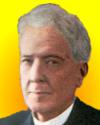 | "Men should stop fighting among themselves and start fighting insects."
- Luther Burbank, American naturalist and horticulturist who was a pioneer of plant breeding. (born 7 Mar 1849)  |
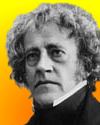 | "A mind which has once imbibed a taste for scientific enquiry, and has learnt the habit of applying its principles readily to the cases which occur, has within itself an inexhaustible source of pure and exciting contemplations."
- Sir John F. W. Herschel, English astronomer. (born 7 Mar 1792)  |
| Before you look at today's web page, see if you can answer some of these questions about the events that happened on this day. Some of the names are very familiar. Others will likely stump you. Tickle your curiosity with these questions, then check your answers on today's web page. |
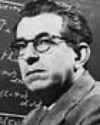 |  A German-American physicist, born 7 Mar 1900, devised the first quantum mechanical treatment of the hydrogen molecule, with Walter Heitler. In a seminal paper (1927), they developed a wave equation for the hydrogen molecule with which it was possible to calculate approximate values of the molecule's ionization potential, heat of dissociation, and other constants. A German-American physicist, born 7 Mar 1900, devised the first quantum mechanical treatment of the hydrogen molecule, with Walter Heitler. In a seminal paper (1927), they developed a wave equation for the hydrogen molecule with which it was possible to calculate approximate values of the molecule's ionization potential, heat of dissociation, and other constants.  Can you name this scientist? Can you name this scientist? |
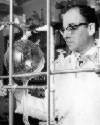 |  Stanley Lloyd Miller, born 7 Mar 1930 is an American chemist who made a series of famous experiments beginning in 1953, to determine the possible origin of life from inorganic chemicals on the primeval, just-formed earth. He passed electrical discharges (simulating thunderstorms) through mixtures of reducing gases, such as hydrogen, ammonia, methane and water, believed to have formed the earliest atmosphere. Analysis days later showed the resulting chemicals included compounds that are the basic building blocks of proteins, together with urea, aldehydes and carboxylic acids. Stanley Lloyd Miller, born 7 Mar 1930 is an American chemist who made a series of famous experiments beginning in 1953, to determine the possible origin of life from inorganic chemicals on the primeval, just-formed earth. He passed electrical discharges (simulating thunderstorms) through mixtures of reducing gases, such as hydrogen, ammonia, methane and water, believed to have formed the earliest atmosphere. Analysis days later showed the resulting chemicals included compounds that are the basic building blocks of proteins, together with urea, aldehydes and carboxylic acids.  What were the simple compounds thus found that can build proteins? What were the simple compounds thus found that can build proteins? |
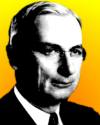 |  William Draper Harkins (1873-1951) was an American nuclear chemist who investigated the structure of the nucleus, and first revealed the basic process of nuclear fusion, the fundamental principle of the thermonuclear bomb. In 1920, Harkins predicted the existence of a particle, in advance of its actual discovery by Chadwick's experiment. William Draper Harkins (1873-1951) was an American nuclear chemist who investigated the structure of the nucleus, and first revealed the basic process of nuclear fusion, the fundamental principle of the thermonuclear bomb. In 1920, Harkins predicted the existence of a particle, in advance of its actual discovery by Chadwick's experiment.  What particle did he predict? What particle did he predict? |
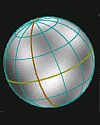
|  On 7 Mar 1996, the first surface photos of Pluto were released. On 7 Mar 1996, the first surface photos of Pluto were released.
 From where were these photos imaged? From where were these photos imaged? |
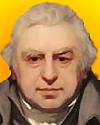
|  On 7 Mar 1799, a meeting was held at the Soho Square house of the President of the Royal Society, Joseph Banks. A list of fifty-eight names was read of gentlemen who had agreed to contribute fifty guineas each to be a Proprietor of a new Institution for diffusing the knowledge, and facilitating the general introduction, of useful mechanical inventions and inprovements; and for teaching, by courses of philosophical lectures and experiments, the application of science to the common purposes of life. On 7 Mar 1799, a meeting was held at the Soho Square house of the President of the Royal Society, Joseph Banks. A list of fifty-eight names was read of gentlemen who had agreed to contribute fifty guineas each to be a Proprietor of a new Institution for diffusing the knowledge, and facilitating the general introduction, of useful mechanical inventions and inprovements; and for teaching, by courses of philosophical lectures and experiments, the application of science to the common purposes of life.  Can you name the scientific society that was founded at his meeting? Can you name the scientific society that was founded at his meeting? |
When you have your answers ready to all the questions above, you'll find all the information to check them, and more, on the March 7 web page of Today in Science History. Or, try this link first for just the brief answers.
Fast answers for the previous newsletter for March 6: Appalachian Trail; Joseph von Fraunhofer; it does not satisfy any algebraic equation with rational coefficients; the decade including the year 1930; Niels Bohr. |
 If you enjoy this newsletter, the website, or wish to offer encouragement or ideas, please send feedback by using your mail reader Reply button. If you enjoy this newsletter, the website, or wish to offer encouragement or ideas, please send feedback by using your mail reader Reply button. |
--
If you do not want to receive any more newsletters,
Unsubscribe To update your preferences and to unsubscribe visit
this link 


 On 7 Mar 1839, Ludwig Mond was born, the German-British chemist whose varied contributions to the chemical industry include perfecting a method of soda manufacture, a process for the extraction of nickel, and coining (with Charles Langer) the term “fuel cell” while attempting to generate electricity by reacting hydrogen with oxygen.
On 7 Mar 1839, Ludwig Mond was born, the German-British chemist whose varied contributions to the chemical industry include perfecting a method of soda manufacture, a process for the extraction of nickel, and coining (with Charles Langer) the term “fuel cell” while attempting to generate electricity by reacting hydrogen with oxygen.



 A German-American physicist, born 7 Mar 1900, devised the first quantum mechanical treatment of the hydrogen molecule, with Walter Heitler. In a seminal paper (1927), they developed a wave equation for the hydrogen molecule with which it was possible to calculate approximate values of the molecule's ionization potential, heat of dissociation, and other constants.
A German-American physicist, born 7 Mar 1900, devised the first quantum mechanical treatment of the hydrogen molecule, with Walter Heitler. In a seminal paper (1927), they developed a wave equation for the hydrogen molecule with which it was possible to calculate approximate values of the molecule's ionization potential, heat of dissociation, and other constants.  Can you name this scientist?
Can you name this scientist?
 Stanley Lloyd Miller, born 7 Mar 1930 is an American chemist who made a series of famous experiments beginning in 1953, to determine the possible origin of life from inorganic chemicals on the primeval, just-formed earth. He passed electrical discharges (simulating thunderstorms) through mixtures of reducing gases, such as hydrogen, ammonia, methane and water, believed to have formed the earliest atmosphere. Analysis days later showed the resulting chemicals included compounds that are the basic building blocks of proteins, together with urea, aldehydes and carboxylic acids.
Stanley Lloyd Miller, born 7 Mar 1930 is an American chemist who made a series of famous experiments beginning in 1953, to determine the possible origin of life from inorganic chemicals on the primeval, just-formed earth. He passed electrical discharges (simulating thunderstorms) through mixtures of reducing gases, such as hydrogen, ammonia, methane and water, believed to have formed the earliest atmosphere. Analysis days later showed the resulting chemicals included compounds that are the basic building blocks of proteins, together with urea, aldehydes and carboxylic acids.  What were the simple compounds thus found that can build proteins?
What were the simple compounds thus found that can build proteins? 
 William Draper Harkins (1873-1951) was an American nuclear chemist who investigated the structure of the nucleus, and first revealed the basic process of nuclear fusion, the fundamental principle of the thermonuclear bomb. In 1920, Harkins predicted the existence of a particle, in advance of its actual discovery by Chadwick's experiment.
William Draper Harkins (1873-1951) was an American nuclear chemist who investigated the structure of the nucleus, and first revealed the basic process of nuclear fusion, the fundamental principle of the thermonuclear bomb. In 1920, Harkins predicted the existence of a particle, in advance of its actual discovery by Chadwick's experiment.  What particle did he predict?
What particle did he predict? 
 On 7 Mar 1996, the first surface photos of Pluto were released.
On 7 Mar 1996, the first surface photos of Pluto were released.  From where were these photos imaged?
From where were these photos imaged? 
 On 7 Mar 1799, a meeting was held at the Soho Square house of the President of the Royal Society, Joseph Banks. A list of fifty-eight names was read of gentlemen who had agreed to contribute fifty guineas each to be a Proprietor of a new Institution for diffusing the knowledge, and facilitating the general introduction, of useful mechanical inventions and inprovements; and for teaching, by courses of philosophical lectures and experiments, the application of science to the common purposes of life.
On 7 Mar 1799, a meeting was held at the Soho Square house of the President of the Royal Society, Joseph Banks. A list of fifty-eight names was read of gentlemen who had agreed to contribute fifty guineas each to be a Proprietor of a new Institution for diffusing the knowledge, and facilitating the general introduction, of useful mechanical inventions and inprovements; and for teaching, by courses of philosophical lectures and experiments, the application of science to the common purposes of life.  Can you name the scientific society that was founded at his meeting?
Can you name the scientific society that was founded at his meeting?  If you enjoy this newsletter, the website, or wish to offer encouragement or ideas, please send feedback by using your mail reader Reply button.
If you enjoy this newsletter, the website, or wish to offer encouragement or ideas, please send feedback by using your mail reader Reply button. 

Δεν υπάρχουν σχόλια:
Δημοσίευση σχολίου